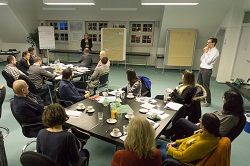More power to social enterprises in rural regions
Rural regions in many European countries face considerable challenges today. They experience a brain drain of young and qualified people especially, and a lack of opportunities for qualified jobs and higher education, and suffer from a declining provision of public and private services. At the same time, social enterprises are appearing as a new type of organisation that operates in a space where the state and the market tend to withdraw, developing novel solutions to initiate social changes and fostering social innovation. In a world where there is limited awareness regarding rural social enterprises and unfavourable institutional conditions, the EU-funded project RurInno (Social Innovations in Structurally Weak Rural Regions) aimed to improve knowledge on how rural social enterprises develop innovative solutions for social challenges. “Little is known about how rural social enterprises operate, what challenges they address, how they innovate and what impact they have,” says Dr Ralph Richter, researcher and project manager. Empowering social enterprises and entrepreneurs An additional project aim was to strengthen the skills and innovative capacity of rural social enterprise staff members. “Many rural social enterprises lack specialised training and education required to bring about the desired social change,” explains Dr Richter. In parallel, part of the project’s efforts focused on raising awareness around rural social enterprises to encourage enabling environments so that these enterprises can achieve their goals. The project brought together academics from two research institutes and practitioners from four rural social enterprises across Europe. The team conducted in-depth field research, interviews and analyses, in addition to providing training. “Staff members of the social enterprises have spent six months in the research institutes in order to enhance their innovative capacity, develop strategies for empowering people in rural communities, and improve skills in communicating products and services,” highlights Dr Richter. RurInno has brought considerable knowledge and skills not only to the four social enterprises within the project but also to others through workshops, field trips and raising awareness regarding best practice examples. It developed a toolkit that addresses six main barriers typically encountered in establishing a rural social enterprise. “The toolkit motivates social enterprises to overcome hurdles and deal with challenges, even if these seem insurmountable at the beginning,” the project manager reveals. Demonstrating positive outcomes The project has shown that social enterprises effectively address social challenges by interconnecting remote regions with supra-regional networks and institutions on other spatial scales. “This mobilises new ideas, extending resources and support for rural communities that would otherwise be hardly available,” affirms Dr Richter. To illustrate, one project partner has helped open technology labs in villages and small towns in Austria to foster creativity and attract talented people. Another built a theme village in Poland that focuses on local traditions and handicraft to foster tourism, while integrating people with special needs into the labour market. Overall, RurInno has raised awareness of the innovation potential of rural social enterprises by publishing a comprehensive policy brief, developing the toolkit with best practices, meeting with EU policymakers, and spreading relevant ideas through the media. It has enabled several social enterprises to bring their work to the public through better communication strategies, providing a wealth of open-source material that can inspire adopters and creating role-model social enterprises.
Keywords
RurInno, social enterprise, rural regions, innovation, rural communities, social change







